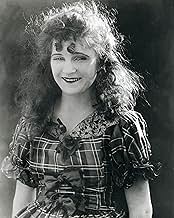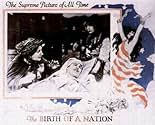The Stoneman family finds its friendship with the Camerons affected by the Civil War, both fighting in opposite armies. The development of the war in their lives plays through to Lincoln's a... Read allThe Stoneman family finds its friendship with the Camerons affected by the Civil War, both fighting in opposite armies. The development of the war in their lives plays through to Lincoln's assassination and the birth of the Ku Klux Klan.The Stoneman family finds its friendship with the Camerons affected by the Civil War, both fighting in opposite armies. The development of the war in their lives plays through to Lincoln's assassination and the birth of the Ku Klux Klan.
- Awards
- 2 wins total
- Col. Ben Cameron aka The Little Colonel
- (as Henry Walthall)
- Silas Lynch - Mulatto Lieut. Governor
- (as George Seigmann)
- Jeff - The Blacksmith
- (as Wallace Reed)
- Abraham Lincoln
- (as Jos. Henabery)
- Wade Cameron - The Second Son
- (as J.A. Beringer)
- Duke Cameron - The Youngest Son
- (as John French)
Featured reviews
Anyone who ever complains about the political correctness or historical "revisionism" of today's academics, see this movie. And understand, that it is the work of historical "revisionists" that are responsible for teaching the facts about our nation's history, grasped out of the hands of fictions like Griffith's horrific Birth of a Nation. And don't be so smug about complaining of political correctness in the future.
And don't try to seperate this film as an artistic work with the historical perspective of the film. Keep in mind, this film was not only a portrayl of history, it was also a *part* of history. It served to defend racial segregation, lychings, and the Klan at a time when all three of those were very real political issues. It is not a coincidence that the greatest period of lychings and Jim Crow laws came shortly after this movie. In short, this film oppressed people. So don't treat it like it existed in an entertainment vacuum, unaffected by and unaffecting everything else around it.
It really is almost like two different movies. The first part, which takes place in the era before and during the Civil War, contains little objectionable material, and it deserves praise both technically and for the acting. The second part, set in the reconstruction era, contains almost all of the disturbing material, and it also is really not all that great in terms of cinematic quality.
Then also, the degree to which "The Birth of a Nation" may have influenced the development of cinema has very likely been overstated . The controversy that it generated may very well have helped it to remain better known than other films of the era that were equally innovative and/or lavish, or nearly so.
If the movie had ended shortly after the memorable and well-crafted Ford's Theater scene, the anti-war sentiment and similar themes would remain the main focus, since the effects of war on families and individuals is depicted convincingly and thoughtfully. In that case, its occasional lapses would possibly at the worst be called "dated", given the quality of the rest of this part of the movie.
The second half, though, is completely unfortunate in almost every respect. Not only does it promote a distorted viewpoint, but the story becomes labored, and the characters lose their depth and become more one-dimensional. The purely technical side, such as the photography and the use of cross-cutting, might still be good, but much of the rest of it loses its effectiveness.
Perhaps more importantly, it really seems rather difficult to justify the credit that this one film gets in the development of cinema. There had already been numerous feature-length movies, and most of the techniques that Griffith used were also in use by others. He may well have been ahead of the pack in terms of appreciating their possibilities, but that does not mean that cinema would not have developed as it did without this particular movie.
Just as one example, the Italian epic "Cabiria", from the previous year, has the same kind of lavish scale, is quite resourceful in its techniques, and is quite entertaining, without causing so much controversy.
Other early feature-length films also include some creative efforts to adapt film-making techniques to longer running times and more complex stories. Finally, many short features from the pre-Griffith era experimented with the same kinds of techniques that he later would use systematically. There's no denying Griffith's considerable technical skill, but others of the era also deserve some credit, even if they and their works were less controversial, and are now largely forgotten as a result.
This movie is not anti-Union, it is not pro-Antebellum south. It is anti-Black. The movie frames the ending of slavery as the beginning of the end for civilized society in the south, brought about by a conspiracy of carpet-baggers and scheming mulattos and blacks. The answers to this issue are redemptive violence by the Klu Klux Klan and a return to the master-servant relationship of slavery. The movie frames "the loyal soul" blacks who accepted their ownership and didn't want slavery to end as the redeemable memebers, while those that welcomed the end of slavery did so entirely to then turn that systemic violence back against the whites.
I genuinely do not believe that you can understand how malicious and hateful this movie is if you haven't seen it. One can have it described to them, one can know the individual scenes of hatred within, but until one has experienced the slow, pernicious leaking of racial hatred firsthand, it can't sink in how contemptible this movie is.
Technically important? Yes, nobody is denying that. Even as the movie's message becomes more and more evil, it is shot with a competency and ambition that it would take the rest of the industry decades to catch up to. It is worthy of preservation in that regard. But it is also entirely indicitave of the era that a movie which makes such strides (and was the first film to see great success in America and be played in the white house) is a movie which frames the idea of a white man being expected to shake a black man's hand as an indignity which exceeds lynchings and enslavement.
pcorder wrote: "Whites could not vote or serve in the government during Reconstruction, Blacks ruled in the Legislatures and this movie showed how they acted during that time. The reason some many liberal whites and blacks HATE this movie is because it is the only movie to ever tell the truth about RECONSTRUCTION."???
Are you high?? what planet are you from?? This couldn't be further from the truth. you obviously don't know your history. or perhaps you know "your story", which is not the same. benefits of a home education, i presume?
to those who praise this movie...let's say a black director makes a film depicting whites as ignorant, violent, subhuman heathens, but hey, its a cinematic masterpiece. Would you be singing its praises? i highly doubt it.
shows just how far we Haven't come...
Did you know
- TriviaPresident Woodrow Wilson is famously rumored to have responded to the film with the remark: "It is like writing history with lightning. And my only regret is that it is all so terribly true." After the film became subject of controversy due to its heroic portrayal of the Ku Klux Klan, Wilson denied through his press secretary as to having known about the nature of the film before screening it at the White House, or having ever endorsed it. Nevertheless, Wilson's published works as a historian are closely aligned with the film's negative portrayal of Reconstruction (some of his writings are even quoted onscreen in certain prints of the film). Wilson was also notably a consistent pro-segregationist as President.
- GoofsThe Ku Klux Klan never fought or won any battles with federal troops, black or white.
- Quotes
intertitle: While youth dances the night away, childhood and old age slumber.
- Crazy creditsThe following was listed in the opening credits: A PLEA FOR THE ART OF THE MOTION PICTURE We do not fear censorship, for we have no wish to offend with improprieties or obscenities, but we do demand, as a right, the liberty to show the dark side of wrong, that we may illuminate the bright side of virtue--the same liberty that is conceded to the art of the written word--that art to which we owe the Bible and the works of Shakespeare.
- Alternate versionsIn both 1921 and 1927, edited versions of the film were released to reflect current political viewpoints.
- ConnectionsEdited into The Revenge of Pancho Villa (1932)
Details
Box office
- Budget
- $110,000 (estimated)
- Runtime
- 3h 15m(195 min)
- Sound mix
- Aspect ratio
- 1.33 : 1













































